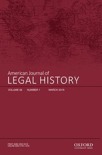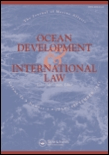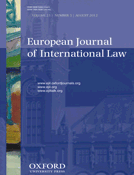
JOURNAL OF THE HISTORY OF INTERNATIONAL LAW
Scope & Guideline
Diving Deep into the Roots of International Law
Introduction
Aims and Scopes
- Historical Development of International Law:
The journal emphasizes the historical trajectories of international law, examining its evolution from early forms to modern practices. This includes studies on foundational figures, landmark treaties, and significant legal milestones across different periods. - Interdisciplinary Approaches:
It integrates methodologies from various disciplines, including history, political science, and sociology, to provide a more nuanced understanding of international law's development and its socio-political implications. - Colonial and Post-Colonial Perspectives:
A consistent focus is placed on colonialism and its impact on international law, exploring themes of decolonization, sovereignty, and the legal frameworks that emerged in post-colonial contexts. - Regional Histories:
The journal also investigates regional specificities in the development of international law, including the contributions of Latin America, Asia, and Africa, thereby addressing often overlooked perspectives in the historical narrative. - Critical and Normative Evaluations:
It encourages critical evaluations of historical legal doctrines and practices, exploring their normative implications and how they inform contemporary legal issues and debates.
Trending and Emerging
- Human Rights and Historical Perspectives:
There is a growing trend of exploring the historical foundations of human rights, examining how past legal frameworks and movements have shaped contemporary human rights discourse. - Decolonization and Sovereignty:
Emerging themes include a focus on the histories of decolonization and the quest for sovereignty, with studies examining how these processes influence current international legal frameworks and state interactions. - Interdisciplinary Connections:
An increasing number of papers are making interdisciplinary connections, integrating insights from sociology, anthropology, and political theory to enrich the understanding of historical international law. - Globalization and International Law:
The journal is witnessing a rise in discussions on globalization's impact on international law, particularly how historical legal practices adapt to and shape contemporary global challenges. - Environmental Law and Historical Context:
Emerging research themes also include the historical analysis of international environmental law, considering how past legal frameworks address current ecological crises and sustainability challenges.
Declining or Waning
- Traditional Eurocentric Legal Narratives:
There is a noticeable decline in publications that focus solely on traditional Eurocentric narratives of international law, as the journal increasingly prioritizes diverse perspectives that challenge established norms. - Static Historical Analyses:
Papers that offer static or uncritical historical analyses of international law are becoming less frequent. The journal seems to be moving towards more dynamic interpretations that consider the complexities and contestations within historical contexts. - Legal Formalism:
Research centered around legal formalism—where law is viewed as a set of rules without consideration of social context—is less prevalent. The journal appears to be favoring approaches that emphasize the interplay between law and social dynamics. - Isolation of Historical Contexts:
There is a decreasing trend in studies that treat historical contexts in isolation, without connecting them to contemporary issues. The journal is favoring works that draw connections between past and present legal challenges.
Similar Journals

Law Text Culture
Bridging Legal Frameworks and Cultural Narratives.Law Text Culture is a pioneering academic journal published by the University of Wollongong, Australia, and is dedicated to the interdisciplinary exploration of law, text, and culture. With its mission to foster innovative scholarly inquiry, this journal serves as a vital platform for researchers, practitioners, and students interested in the intersection of legal studies, literature, and cultural analysis. The journal's ISSN is 1322-9060 and its E-ISSN is 2200-7121. Although currently not an open access journal, it aims to contribute significantly to academic discourse, inviting submissions that critique and elucidate the complex relationships between legal frameworks and cultural narratives. As a resource with the potential for high scholarly impact, Law Text Culture is positioned to address key contemporary issues facing the legal profession and its representation in various textual forms.

Utrecht Journal of International and European Law
Unlocking Insights in International LawUtrecht Journal of International and European Law, published by UBIQUITY PRESS LTD, serves as a dynamic platform for the dissemination of scholarly research in the realms of international and European law. Since its inception as an open-access journal in 2013, it has provided unrestricted access to cutting-edge legal scholarship, fostering global dialogue among legal professionals, researchers, and students. With a notable Scopus rank of 249 out of 1,025 in the law category and a commendable Q3 rating, the journal emphasizes innovative legal theories and practices relevant to contemporary global challenges. Located in the heart of the United Kingdom, the Utrecht Journal is committed to maintaining high academic standards while also promoting the exchange of knowledge across borders, which is crucial given the ever-evolving landscape of international law. As it converges its focus from 2020 to 2024, the journal seeks to become an essential reference for those dedicated to the exploration and expansion of legal discourse in this vital field.

VIRGINIA LAW REVIEW
Cultivating a Legacy of Legal ExcellenceVIRGINIA LAW REVIEW is a preeminent legal journal published by the University of Virginia Law Review Association, recognized for its rigorous scholarship and intellectual discourse in the field of law. With an ISSN of 0042-6601, this journal has maintained a prominent position in academia, reflected in its Q1 category ranking in law and a Scopus ranking of #167 out of 1025, placing it in the top 17% of its field. Drawing upon a rich tradition dating back to its inception in 1967 and covering a broad spectrum from legal theory to practical applications, the Virginia Law Review aims to foster innovative legal thought and engage both scholars and practitioners. While it does not currently operate under an open access model, its contributions to scholarly research are invaluable, providing insights that significantly influence legal practices and policies. Situated in Charlottesville, Virginia, at 580 Massie Road, this esteemed publication appeals to researchers, legal professionals, and students alike, making it an essential resource for anyone eager to delve into the complexities of contemporary legal issues.

AMERICAN JOURNAL OF LEGAL HISTORY
Exploring the Roots of JusticeAmerican Journal of Legal History, published by Oxford University Press, is a distinguished periodical dedicated to advancing the study of legal history. With an ISSN of 0002-9319 and an E-ISSN of 2161-797X, this journal has been a vital resource for legal historians and scholars interested in the interplay between law and societal developments since its inception. Covering significant converged years from 1976 to 2024, the journal promotes a comprehensive understanding of legal traditions and historical context, appealing to those in both the History (Q3) and Law (Q4) categories as measured by recent quartile assessments. The journal ranks respectably in Scopus, with the field of Arts and Humanities – History at rank 935 and Social Sciences – Law at rank 788, making it a critical tool for researchers, professionals, and students seeking to deepen their understanding of legal systems over time. Although it is not an open-access journal, its invaluable insights into legal history render it a necessary read for those looking to enrich their academic pursuits.

Comparative Legal History
Fostering Interdisciplinary Dialogues in Law and History.Comparative Legal History is a premier scholarly journal published by Routledge Journals, Taylor & Francis Ltd, dedicated to advancing the understanding of legal systems through the lens of historical analysis. With an impressive impact factor reflecting its academic rigor, this journal has established itself as a vital resource for researchers, professionals, and students alike who seek to explore the intersections of law and history. The journal is ranked in the Q1 category in History and Q2 in Law, demonstrating its quality and relevance in these fields. Covering a wide array of subjects related to comparative legal studies from its inception in 2013, the journal publishes original research, critical essays, and discussions on historical legal practices and their contemporary implications. Comparative Legal History provides a unique platform for interdisciplinary scholarship, contributing significantly to the academic discourse in both history and law, making it an essential publication for anyone involved in these disciplines.

Grotiana
Advancing Knowledge in Historical JurisprudenceGrotiana, a prestigious journal published by BRILL, stands as a vital resource for scholars and professionals engaged in the fields of History and Law. With its ISSN 0167-3831 and E-ISSN 1876-0759, this journal has been a beacon of academic inquiry since its inception, covering a diverse array of topics with an emphasis on legal history and historical jurisprudence. Grotiana holds a commendable impact within the academic community, reflected in its 2023 Scopus ranks indicating a 91st percentile in History and a 67th percentile in Law, underscoring its significance in interdisciplinary studies. Although not an open-access journal, it offers robust access options for institutions and individuals alike, facilitating research and knowledge dissemination. Scholars can benefit from its rich historical insights and rigorous legal analysis, contributing to the ongoing dialogue in these fields. With publishing cycles spanning from 1980 to 2024, Grotiana continues to uphold its commitment to excellence, making it a pivotal player for researchers, students, and professionals pursuing a deeper understanding of historical and legal frameworks.

AMERICAN JOURNAL OF COMPARATIVE LAW
Illuminating Legal Principles Across BordersAmerican Journal of Comparative Law is a premier scholarly publication dedicated to the field of comparative law, published by Oxford University Press. Established in 1974, the journal has consistently served as a vital resource for researchers, practitioners, and students seeking insights into the legal systems across different jurisdictions. With an impressive ranking of Q3 in both the Law and Miscellaneous Social Sciences categories for 2023, it reflects a solid position in the academic landscape, ranking 400 out of 1025 in the Scopus database, placing it in the 61st percentile. The journal offers comprehensive analyses and discussions that foster understanding and dialogue around legal principles and practices, making it an invaluable tool for those involved in legal scholarship or practice. While it does not currently offer open access, the journal's commitment to high-quality, peer-reviewed content ensures that it continues to be a pivotal outlet for legal research and comparative studies.

Ius Canonicum
Advancing Scholarly Dialogue in Ecclesiastical Law.Ius Canonicum is a distinguished academic journal published by UNIV NAVARRA, SERVICIO PUBLICACIONES, based in Spain. With an ISSN of 0021-325X and an E-ISSN of 2254-6219, the journal serves as a vital platform for scholars, researchers, and students delving into the realms of Law and Religious Studies. Recognized within the Scopus rankings, it holds a commendable position at Rank #120 in Religious Studies and Rank #540 in Law, reflecting its strong impact and relevance, particularly evident in its Q2 and Q3 category quartiles for 2023. Ius Canonicum seeks to foster international discourse on ecclesiastical law while providing critical insights into the evolving interpretations and applications of canonical principles. Despite its traditional publication model, the journal remains pivotal in advancing scholarly dialogue within its converged years from 2016 to 2024, serving as an invaluable resource for those engaged in legal studies and the theological dimensions of law.

OCEAN DEVELOPMENT AND INTERNATIONAL LAW
Exploring Interdisciplinary Solutions for Marine ChallengesOCEAN DEVELOPMENT AND INTERNATIONAL LAW, published by Taylor & Francis Inc, is an esteemed journal dedicated to the interdisciplinary study of ocean governance, environmental law, and international relations concerning marine resources. With an ISSN of 0090-8320 and an E-ISSN of 1521-0642, this journal serves as a vital platform for researchers, legal scholars, and policymakers interested in the evolving challenges of ocean development in a globalized context. The journal has established itself as a resourceful publication, evidenced by its ranking in the 2023 Scopus categories, where it is positioned in the 75th percentile for Law and the 66th percentile for Political Science and International Relations. Operating for over four decades, from 1973 until 2024, it is pivotal for advancing knowledge and fostering dialogue on critical issues such as environmental sustainability, international maritime policies, and legal frameworks governing the seas. Despite being a subscription-based journal, OCEAN DEVELOPMENT AND INTERNATIONAL LAW remains influential, offering significant insights that contribute to the development of effective legal instruments and governance strategies for oceanic resources.

European Journal of International Law
Championing diverse perspectives in international law.The European Journal of International Law (EJIL), published by Oxford University Press, stands as a leading platform for the dissemination of innovative research in the realms of International Law and Political Science. With an impressive ISSN of 0938-5428 and E-ISSN of 1464-3596, this prestigious journal has achieved Q1 rankings in both Law and Political Science and International Relations categories as of 2023, emphasizing its significance among contemporary scholarly publications. Spanning contributions from a diverse range of disciplines, the EJIL serves as an essential resource for researchers, professionals, and students alike, promoting critical dialogue on pressing international legal issues. Although currently not offered as an open-access journal, it continues to retain a high impact factor, as evidenced by its substantial Scopus rankings, placing it within the top percentiles in multiple categories. Its commitment to scholarly excellence is reflected in a convergence of research trends from 2005 to 2024, and it remains dedicated to fostering informed discourse on global legal frameworks and their implications.